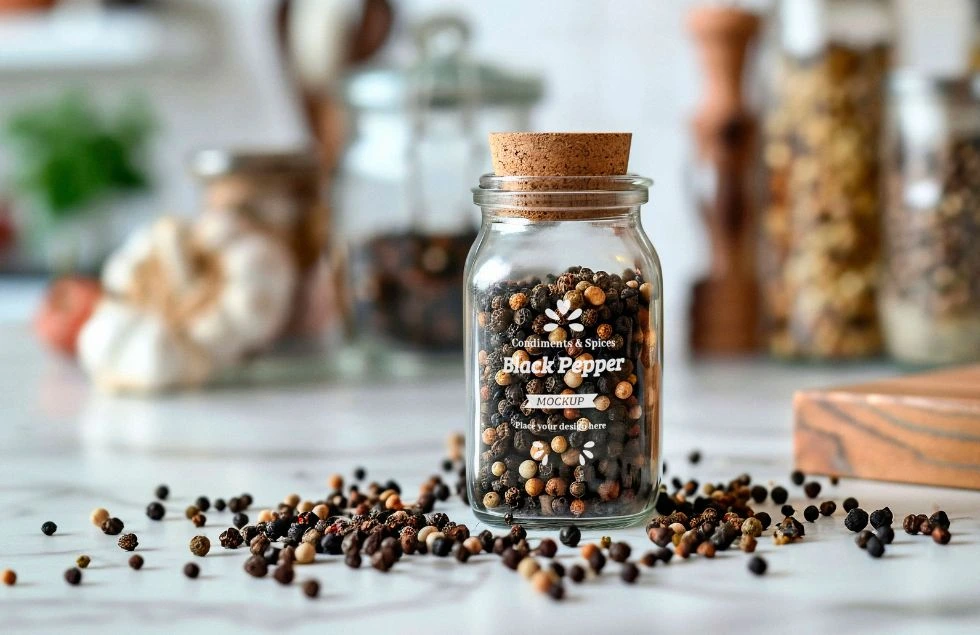From Harvest to Packaging: How Black Pepper is Manufactured at VLC Spices
Black pepper powder is one of the most widely used spices in kitchens and food industries worldwide. But the quality, taste, and aroma of the peppers depend on their journey from cultivation to packaging. Every stage, from farming to grinding and packaging, plays a crucial role in determining the freshness and purity of the final product.
In this blog, we will take you through the entire manufacturing process of black pepper powder, explaining how it is cultivated, processed, and how we package it before reaching the culinary and pharmaceutical sector.
1. Cultivation and Harvesting
Black pepper, scientifically known as Piper nigrum, is a tropical vine that thrives in warm, humid climates. The plant requires a well-drained, loamy soil rich in organic matter. It is commonly grown in states like Tamil Nadu, Karnataka, and Kerala.
Harvesting occurs when the pepper berries begin to turn yellowish-red, indicating ripeness. If harvested too early, the peppercorns lack flavour, and if left too long, they may lose their pungency. At VLC Spices, we get our pepper from the best farms in India.
2. Post-Harvest Processing
After harvesting, black pepper berries retain moisture and require proper drying to improve their shelf life and flavour profile. The drying process is critical as it determines the final colour, taste, and pungency of the black pepper powder.
Drying Methods
At VLC Spices, we follow the traditional sun-drying process, where the berries are spread out on concrete surfaces or mats under direct sunlight for about five to seven days.
Once dried, the peppercorns shrink and turn dark black. The moisture content is reduced to 10-12%, which is necessary to prevent mould formation and spoilage. Proper drying ensures the retention of piperine, the compound responsible for the characteristic pungency of black pepper.
After drying, the peppercorns go through a sorting and grading process, where they are classified based on size, density, and quality. Higher-grade peppercorns are used for premium spice production, while lower grades may be used for industrial purposes.
3. Grinding and Powder Processing
After the drying and grading process, the black peppercorns are prepared for grinding. The quality of grinding directly impacts the texture, flavour, and oil retention of the final powder.
Pre-Grinding Preparation
Before being ground into powder, the peppercorns may undergo a roasting process to enhance their aroma. This step is optional but is often used in commercial spice processing to give a richer and more intense flavour.
Grinding Machinery
Different grinding methods and machinery are used based on the required particle size and fineness of the black pepper powder.
- One of the most commonly used methods is hammer milling, where high-speed rotating hammers crush the peppercorns into fine powder.
- Another widely used technique is pulverising, where the peppercorns are ground using high-pressure machines to produce an ultra-fine powder suitable for packaging.
- For premium-grade black pepper powder, cryogenic grinding is used. In this process, liquid nitrogen is applied to cool the peppercorns before grinding.
The next step is quality control.
4. Quality Control and Testing
Quality control is a crucial step in black pepper powder production. Since spices are prone to contamination and adulteration, manufacturers follow strict quality standards to ensure that the final product meets international safety regulations.
The moisture content of the black pepper powder must be maintained below 12% to prevent microbial growth and spoilage.
Black pepper powder undergoes microbial testing to check for bacteria, fungi, and pathogens that could pose health risks.
It is tested for pesticide residues, heavy metals, and adulterants to comply with safety standards set by organisations such as the FDA and FSSAI.
5. Packaging and Storage
Once the black pepper powder has passed quality checks, it is ready for packaging and distribution. Packaging plays a vital role in preserving freshness, preventing contamination, and extending shelf life.
To maintain freshness, black pepper powder should be stored in a cool, dry environment away from direct sunlight. Proper storage conditions prevent flavour loss, rancidity, and contamination, ensuring a long shelf life of up to 24 months.
6. Distribution and Market Reach
At VLC Spices, our primary focus is on bulk orders. Our safely packed black pepper is shipped all around the world in the culinary sector for HoReCa and in the pharma sector for its medicinal benefits. We follow every safety protocol and swear by our unadulterated spices. Our customers can also take advantage of our labelling services.
Conclusion
The manufacturing process of black pepper powder involves multiple intricate steps, from careful farming and harvesting to grinding and packaging. Each stage is essential to ensure superior quality, strong aroma, and rich flavour in the final product.
If you are interested in buying black pepper in bulk or taking advantage of our white labelling services, you can reach out to us at VLC Spices. Along with black pepper, we also sell chilli powder, cloves, cinnamon, coriander seeds, and other Indian spices. Contact us TODAY!
.






